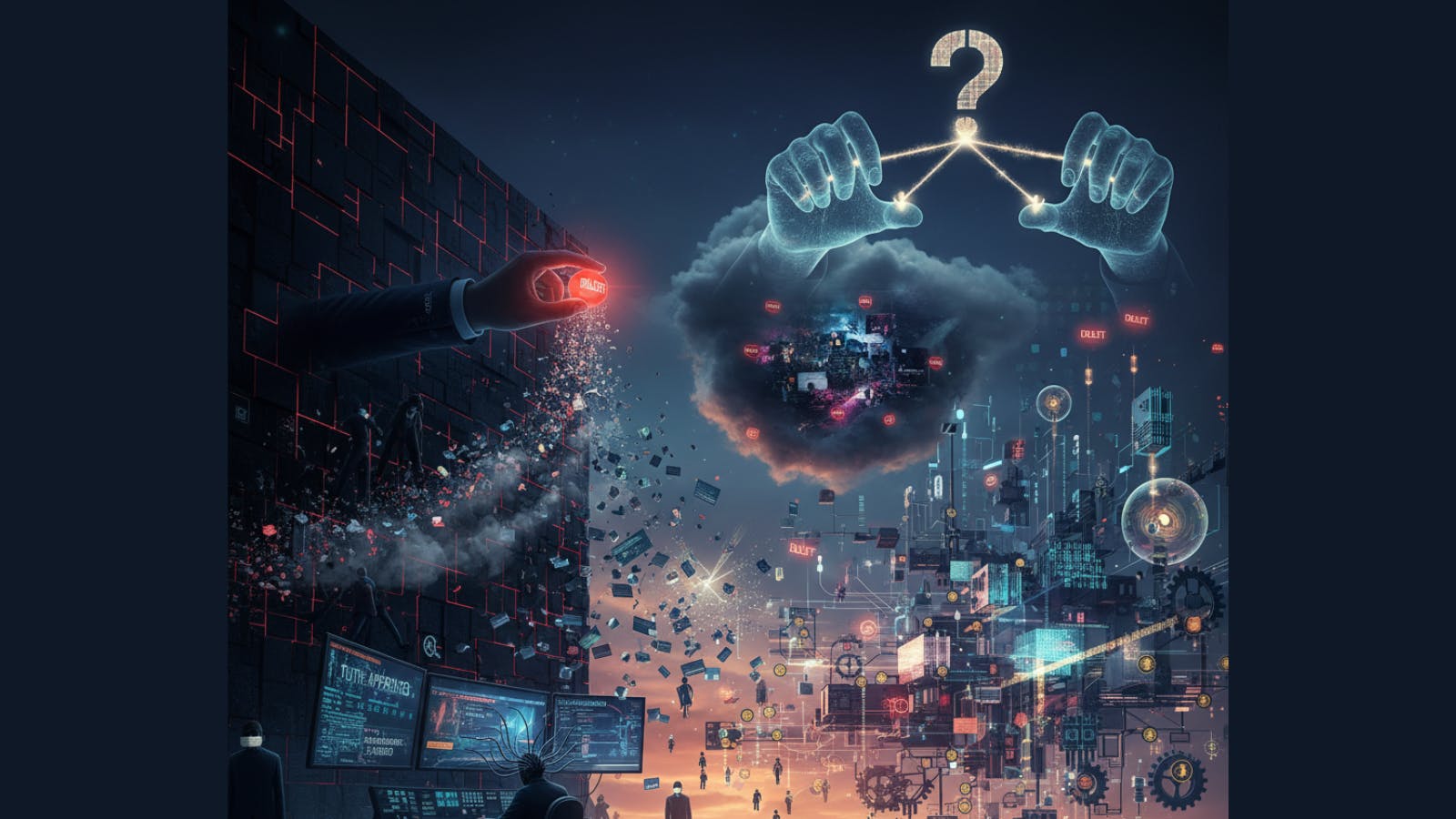What “Censorship” Means Online Today
Anyone using social media in 2025 is no stranger to censorship. We live in, I would guess, the most censored time in history thanks to technology. Online censorship isn’t just about governments blocking websites anymore. It’s the quiet, everyday control over what people see, share, and say. That can mean social platforms deleting “sensitive” posts, algorithms burying unpopular opinions, payment processors cutting off creators, or news feeds tuned to keep users docile and advertisers happy. It’s not always loud—it’s often invisible.
In short, censorship on the internet today isn’t just about silencing voices. It’s about shaping what counts as truth, visibility, and reality itself.
Enter the Decentralized Internet
The decentralized internet flips that model on its head. Instead of relying on a few platforms or data giants to host and police everything, it spreads power across a network of independent nodes and users. No single authority can pull the plug or rewrite the rules overnight.
In theory, this setup could make censorship nearly impossible—content lives everywhere and nowhere at once. But as with anything that involves humans and power, it’s not that simple.
Can a Decentralized Internet Really Eliminate Censorship?
Decentralization has become the tech world’s favorite battle cry. “No gatekeepers! No censorship!” Sounds good on paper. But can a decentralized internet truly eliminate censorship—or are we just trading one form of control for another with cooler branding?
The Dream
In theory, decentralization means freedom. No government throttling your voice. No social media giant deciding your post is “against community guidelines.” Just users talking to users on a network that nobody owns and everyone shapes.
That’s the ideal. But ideals tend to melt when they hit real traffic.
The Reality
Even without traditional gatekeepers, censorship doesn’t just vanish—it evolves. Once you remove centralized moderation, new power structures step in wearing different shoes.
Here’s how the new “freedom” can still bite you:
- Protocol-Level Power Plays: Whoever controls the core code or token governance can quietly steer the network. Censorship by consensus is still censorship.
- Economic Filters: If your project or voice isn’t profitable or politically convenient, you’ll find yourself shouting into a void with no funding.
- Algorithmic Favoritism: Even decentralized systems use algorithms. If your content doesn’t fit the metrics that drive engagement or consensus, it fades into obscurity.
- Social Pressure: Decentralized communities still form echo chambers. Instead of being banned, you get shunned—or ignored—because you don’t fit the vibe.
Censorship isn’t always a guy in a suit pressing a red button. Sometimes it’s a thousand small levers being pulled by invisible hands.
Power Never Dies—It Just Changes Hands
Decentralization doesn’t kill control; it redistributes it. It’s a massive step toward resilience and transparency, sure, but not a magic eraser. Power doesn’t disappear—it shapeshifts. It goes from corporations and governments to whales, dev teams, and social consensus.
And that’s still progress. At least in a decentralized internet, the rules can be challenged, audited, forked, or re-written. That’s something we’ve never really had before.
Total Censorship Resistance: Dream or Disaster?
Let’s be honest—total censorship resistance sounds cool until you think about what that actually means.
No one being able to delete anything also means no one being able to delete anything. Every scam, hate rant, doxx, and deepfake gets eternal life on an unstoppable network. That’s not “free speech paradise,” that’s digital chaos with a PR team.
Absolute freedom online has a dark mirror: zero accountability. And that’s where the trade-off shows up.
- No moderation = no brakes. If every voice carries the same weight, the loudest and most extreme often drown out the rest.
- Permanence cuts both ways. Great for preserving truth. Terrible for revenge porn or misinformation that mutates faster than you can fact-check it.
- Anonymity protects and exposes. It shields dissidents, but also bad actors who know exactly how to exploit that cover.
So is total censorship resistance possible? Technically, maybe.
Is itdesirable? Not unless we enjoy turning the internet into a digital landfill.
The goal shouldn’t be a world where nothing can be removed—it should be a world where no one group gets to decide what stays or goes. Balance is the real freedom.
The Takeaway
Decentralization won’t kill censorship—it’ll just change its outfit. The difference is, this time, we can see who’s pulling the strings.
True freedom online isn’t about erasing control; it’s about distributing it so no one gets to play god with the feed. The tech can only go so far—what really matters is whether we, as users, can handle the messiness that comes with open speech.
Because the problem was never just centralization.
It’s that every time we escape one cage, we start building another.


